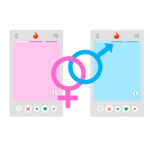In today’s culture, there is wide-reaching access to numerous dating apps based on individual interests, proximity, preferences, and many more unique traits. The evolvement of modern day functioning has established the need and expectation for convenience, superfluous options, and immediate gratification. With so many available options, the popularity of dating apps has significantly increased in recent years, and particularly with the onset of the pandemic causing isolation and loneliness. While dating apps can offer several benefits such as access to make connections among communities that otherwise may not be available in person, there are pitfalls as well that affect its users.
The research, testimonials, and feedback from dating app users have noted some negative experiences such as forms of harassment from people they have never met in person. For instance, female users in particular have expressed concerns about receiving unprompted sexually explicit messages or images, which made them feel hurt, dismissed, and of lesser value as a human. According to BBC article about the downsides of online dating, recent data from 2020 found that 57% of female online daters ages 18-34 had received unsolicited sexual messages or photos. Likewise, a 2017 study found that 36% of online daters described their interactions as “either extremely or very upsetting”, which can create psychological distress. These investigations have prompted the need for greater accountability among the dating app industry. In response, some dating apps have taken precautions to better serve and protect its users. There have been additions made with machine learning, systematic filtering/screening, safety measures, more thorough or strict profile identifiers, and empowerment for marginalized groups to initiate communication and contact. Such problems do not invalidate the positive interactions that many experience with dating apps, and in fact, there are many successes with finding long-term commitment, partners, and even spouses. However, attention has been called to the potential risks, harm, and dangers on these platforms because such behaviors should not be normalized or accepted among those who are targeted.
In addition to ensuring safety and caution with online dating, these issues highlight the importance of maintaining good mental health and strong social support in the face of all the stressors we endure. Likewise, psychoeducation to the community about the true impact of online abuse and harassment can help people gain perspective and perhaps adopt more considerate ways of communicating. Further, dating apps would benefit from ongoing modifications to make the interactions positive, healthy, and safe for all. Although dating apps can function as a light-hearted social outlet and can potentially establish meaningful connections and relationships, they are not exempt from some inherent problems too. For people who still desire to meet someone special in their lives through the convenience of online dating, these considerations are warranted to acknowledge that it can have some obstacles and difficulties, and yet there can be rewarding outcomes as well.
